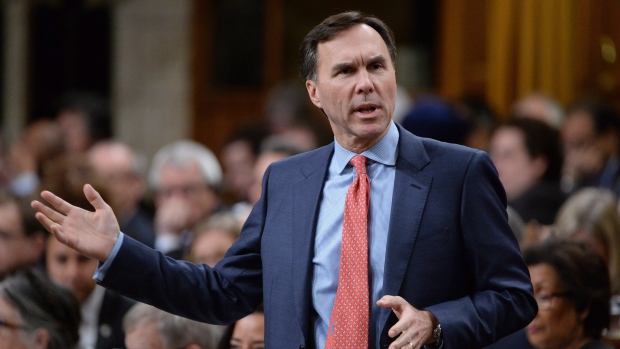Dec 16, 2016
Provinces' health funding demands 'out of the realm' of what feds would consider: Bill Morneau
, The Canadian Press

OTTAWA -- Provincial demands for an increase in federal health transfers are "out of the realm" of anything the Trudeau government would consider, Canada's finance minister said Friday.
In an interview ahead of Monday's federal-provincial meeting on health funding, Bill Morneau insisted Ottawa won't agree to keep the annual increases in transfers — the health "escalator" — above three per cent or the yearly level of growth in nominal gross domestic product.
Ottawa also won't entertain calls to raise the federal share of spending to 25 per cent of provincial health budgets, Morneau told The Canadian Press in an interview Friday.
Instead, he said the government is only willing to explore ways to work with the provinces on specific investments in areas that Ottawa believes will have an measurable impact, such as home care and mental health.
"The provinces' requests are out of the realm of anything that we would consider," said Morneau, who is hosting ministers for a working dinner Sunday night before Monday's main event.
"We're not going to be talking about percentages — either in the escalator ... or in terms of the broader percentages."
Morneau's remarks make it clear that a significant gap remains between the two sides heading into the next phase of the long-running talks.
The federal government fully intends to allow the escalator to drop to three per cent from six, which is where it's been since 2004.
Starting in April, the rate is due to drop to three per cent, or the three-year moving average of nominal gross domestic product growth, whichever is higher.
Provinces and territories say they fear the decrease will create big holes in health care budgets that they insist need every federal dollar they get.
Some provinces support a new 10-year federal funding proposal, brought forward by Ontario, that would see health transfers increase by 5.2 per cent a year, among other changes.
Other provinces have called on Ottawa to gradually increase its share of provincial health care budgets to 25 per cent, up from the current level of around 20 per cent.
Ottawa has accused the provinces, which are responsible for health care delivery under the Constitution, of channelling federal health payments into their general revenues.
The only way the federal government could be willing to budge, Morneau suggested, would be on recent requests by the premiers for longer-term federal investments in areas like home care and mental health.
The feds are indeed prepared to offer more cash for health care, he added — but only if the provinces will work with Ottawa on its goals.
"If the provinces are able to get to agree to our approach, which is specific deliverables on home care and mental health, then we're willing to invest in those areas and we're also willing to invest over the longer term," said Morneau, who added he's "cautiously optimistic" that the provinces will agree to the federal proposal.
"And if we are able to get to those agreements, at a level of investment that we are comfortable with, then we will have a positive day on Monday."
He also pointed to the Liberal government's 2015 campaign commitment to invest $3 billion on home care — money that was not allocated in the 2016 budget.
The Liberal platform said the home-care funding would be spread out over four years and would start to flow immediately.
Morneau would not confirm Friday whether that money would be included in the 2017 budget.